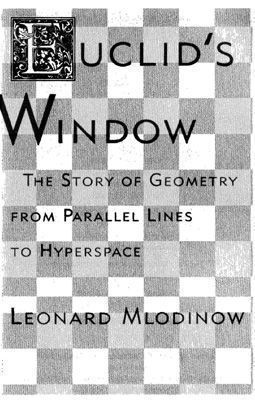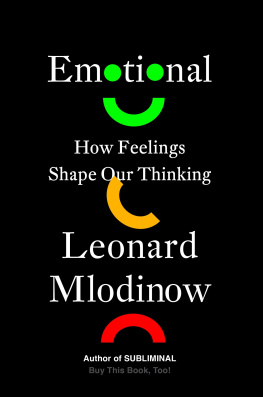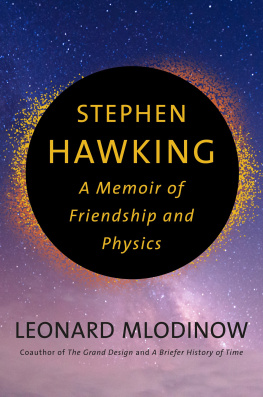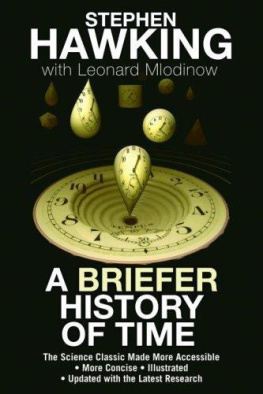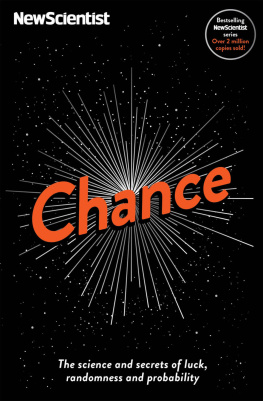Leonard Mlodinow - The Drunkards Walk
Here you can read online Leonard Mlodinow - The Drunkards Walk full text of the book (entire story) in english for free. Download pdf and epub, get meaning, cover and reviews about this ebook. City: New York, year: 2008, publisher: Pantheon Books;Knopf Doubleday Publishing Group, genre: Romance novel. Description of the work, (preface) as well as reviews are available. Best literature library LitArk.com created for fans of good reading and offers a wide selection of genres:
Romance novel
Science fiction
Adventure
Detective
Science
History
Home and family
Prose
Art
Politics
Computer
Non-fiction
Religion
Business
Children
Humor
Choose a favorite category and find really read worthwhile books. Enjoy immersion in the world of imagination, feel the emotions of the characters or learn something new for yourself, make an fascinating discovery.

- Book:The Drunkards Walk
- Author:
- Publisher:Pantheon Books;Knopf Doubleday Publishing Group
- Genre:
- Year:2008
- City:New York
- Rating:4 / 5
- Favourites:Add to favourites
- Your mark:
- 80
- 1
- 2
- 3
- 4
- 5
The Drunkards Walk: summary, description and annotation
We offer to read an annotation, description, summary or preface (depends on what the author of the book "The Drunkards Walk" wrote himself). If you haven't found the necessary information about the book — write in the comments, we will try to find it.
Abstract: An irreverent look at how randomness influences our lives, and how our successes and failures are far more dependent on chance events than we recognize
The Drunkards Walk — read online for free the complete book (whole text) full work
Below is the text of the book, divided by pages. System saving the place of the last page read, allows you to conveniently read the book "The Drunkards Walk" online for free, without having to search again every time where you left off. Put a bookmark, and you can go to the page where you finished reading at any time.
Font size:
Interval:
Bookmark:
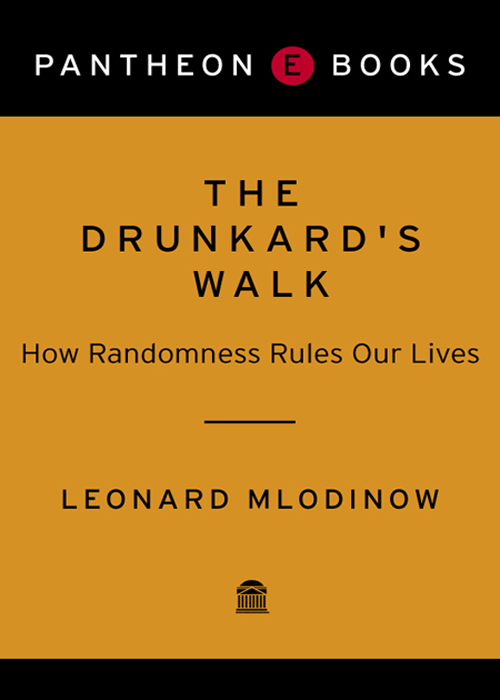
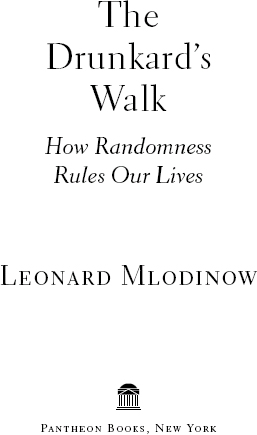
CONTENTS
Chapter 1: Peering through the Eyepiece of Randomness
The hidden role of chancewhen human beings can be outperformed by a rat.
Chapter 2: The Laws of Truths and Half-Truths
The basic principles of probability and how they are abusedwhy a good story is often less likely to be true than a flimsy explanation.
Chapter 3: Finding Your Way through a Space of Possibilities
A framework for thinking about random situationsfrom a gambler in plague-ridden Italy to Lets Make a Deal.
Chapter 4: Tracking the Pathways to Success
How to count the number of ways in which events can happen, and why it mattersthe mathematical meaning of expectation.
Chapter 5: The Dueling Laws of Large and Small Numbers
The extent to which probabilities are reflected in the results we observeZenos paradox, the concept of limits, and beating the casino at roulette.
Chapter 6: False Positives and Positive Fallacies
How to adjust expectations in light of past events or new knowledgemistakes in conditional probability from medical screening to the O. J. Simpson trial and the prosecutors fallacy.
Chapter 7: Measurement and the Law of Errors
The meaning and lack of meaning in measurementsthe bell curve and wine ratings, political polls, grades, and the position of planets.
Chapter 8: The Order in Chaos
How large numbers can wash out the disorder of randomnessor why 200,000,000 drivers form a creature of habit.
Chapter 9: Illusions of Patterns and Patterns of Illusion
Why we are often fooled by the regularities in chance eventscan a million consecutive zeroes or the success of Wall Street gurus be random?
Chapter 10: The Drunkards Walk
Why chance is a more fundamental conception than causalityBruce Willis, Bill Gates, and the normal accident theory of life.
To my three miracles of randomness:
Olivia, Nicolai, and Alexei
and for Sabina Jakubowicz
PROLOGUE
A FEW YEARS AGO a man won the Spanish national lottery with a ticket that ended in the number 48. Proud of his accomplishment, he revealed the theory that brought him the riches. I dreamed of the number 7 for seven straight nights, he said, and 7 times 7 is 48. Those of us with a better command of our multiplication tables might chuckle at the mans error, but we all create our own view of the world and then employ it to filter and process our perceptions, extracting meaning from the ocean of data that washes over us in daily life. And we often make errors that, though less obvious, are just as significant as his.
The fact that human intuition is ill suited to situations involving uncertainty was known as early as the 1930s, when researchers noted that people could neither make up a sequence of numbers that passed mathematical tests for randomness nor recognize reliably whether a given string was randomly generated. In the past few decades a new academic field has emerged to study how people make judgments and decisions when faced with imperfect or incomplete information. Their research has shown that when chance is involved, peoples thought processes are often seriously flawed. The work draws from many disciplines, from mathematics and the traditional sciences as well as cognitive psychology, behavioral economics, and modern neuroscience. But although such studies were legitimated by a recent Nobel Prize (in Economics), their lessons for the most part have not trickled down from academic circles to the popular psyche. This book is an attempt to remedy that. It is about the principles that govern chance, the development of those ideas, and the manner in which they play out in politics, business, medicine, economics, sports, leisure, and other areas of human affairs. It is also about the way we make choices and the processes that lead us to make mistaken judgments and poor decisions when confronted with randomness or uncertainty.
Information that is lacking often invites competing interpretations. Thats why such great effort was required to confirm global warming, why drugs are sometimes declared safe and then pulled from the market, and presumably why not everyone agrees with my observation that chocolate milkshakes are an indispensable component of a heart-healthy diet. Unfortunately the misinterpretation of data has many negative consequences, both large and small. As well see, for example, both doctors and patients often misinterpret statistics regarding the effectiveness of drugs and the meaning of important medical tests. Parents, teachers, and students misunderstand the significance of exams such as the SAT, and wine connoisseurs make the same mistakes about wine ratings. Investors draw invalid conclusions from the historical performance of mutual funds.
In sports we have developed a culture in which, based on intuitive feelings of correlation, a teams success or failure is often attributed largely to the ability of the coach. As a result, when teams fail, the coach is often fired. Mathematical analysis of firings in all major sports, however, has shown that those firings had, on average, no effect on team performance. Had Wendts task been impossible? Was he asleep at the wheel? Or had his coronation rested on questionable assumptionsfor example, that an executive has a near-absolute ability to affect a company or a persons single past success is a reliable indicator of future performance? On any specific occasion one cannot be confident of the answers without examining the details of the situation at hand. I will do that in several instances in this book, but more important, I will present the tools needed to identify the footprints of chance.
To swim against the current of human intuition is a difficult task. As well see, the human mind is built to identify for each event a definite cause and can therefore have a hard time accepting the influence of unrelated or random factors. And so the first step is to realize that success or failure sometimes arises neither from great skill nor from great incompetence but from, as the economist Armen Alchian wrote, fortuitous circumstances. Random processes are fundamental in nature and are ubiquitous in our everyday lives, yet most people do not understand them or think much about them.
The title The Drunkards Walk comes from a mathematical term describing random motion, such as the paths molecules follow as they fly through space, incessantly bumping, and being bumped by, their sister molecules. That can be a metaphor for our lives, our paths from college to career, from single life to family life, from first hole of golf to eighteenth. The surprise is that the tools used to understand the drunkards walk can also be employed to help understand the events of everyday life. The goal of this book is to illustrate the role of chance in the world around us and to show how we may recognize it at work in human affairs. I hope that after this tour of the world of randomness, you, the reader, will begin to see life in a different light, with a deeper understanding of the everyday world.
CHAPTER 1
Peering through the Eyepiece of Randomness
I REMEMBER, as a teenager, watching the yellow flame of the Sabbath candles dancing randomly above the white paraffin cylinders that fueled them. I was too young to think candlelight romantic, but still I found it magicalbecause of the flickering images created by the fire. They shifted and morphed, grew and waned, all without apparent cause or plan. Surely, I believed, there must be rhyme and reason underlying the flame, some pattern that scientists could predict and explain with their mathematical equations. Life isnt like that, my father told me. Sometimes things happen that cannot be foreseen. He told me of the time when, in Buchenwald, the Nazi concentration camp in which he was imprisoned and starving, he stole a loaf of bread from the bakery. The baker had the Gestapo gather everyone who might have committed the crime and line the suspects up. Who stole the bread? the baker asked. When no one answered, he told the guards to shoot the suspects one by one until either they were all dead or someone confessed. My father stepped forward to spare the others. He did not try to paint himself in a heroic light but told me that he did it because he expected to be shot either way. Instead of having him killed, though, the baker gave my father a plum job, as his assistant. A chance event, my father said. It had nothing to do with you, but had it happened differently, you would never have been born. It struck me then that I have Hitler to thank for my existence, for the Germans had killed my fathers wife and two young children, erasing his prior life. And so were it not for the war, my father would never have emigrated to New York, never have met my mother, also a refugee, and never have produced me and my two brothers.
Next pageFont size:
Interval:
Bookmark:
Similar books «The Drunkards Walk»
Look at similar books to The Drunkards Walk. We have selected literature similar in name and meaning in the hope of providing readers with more options to find new, interesting, not yet read works.
Discussion, reviews of the book The Drunkards Walk and just readers' own opinions. Leave your comments, write what you think about the work, its meaning or the main characters. Specify what exactly you liked and what you didn't like, and why you think so.

